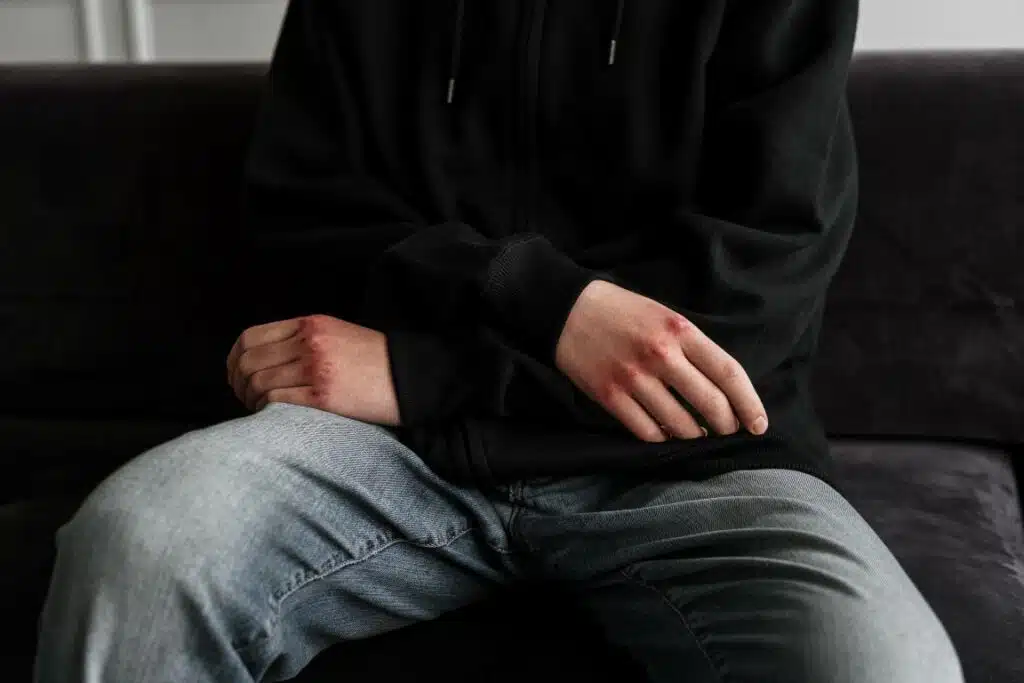Children and teenagers are more prone to trauma than many adults understand. The effects of trauma in children can often be seen in the teen trauma responses like bad behavior or actions. They may not show any signs of the event happening, but they can still be traumatized by it.
Trauma Response or Bad Behavior
Young people can have a trauma reaction to any event in which they believe they or someone they care about could have been killed or badly hurt. Abuse, including sexual and physical, violent crimes, natural disasters and even national events that do not directly impact the child can cause a trauma response.
In fact, the National Center for PTSD estimates as many as 43% of youth go through at least one traumatic experience in their childhood.
Parents need to understand that children, even teenagers, do not have the emotional maturity to process traumatic events. As a result, they may develop what is known as a trauma response. Trauma responses can look like bad behavior, when in fact they are simply a psychological response to a real or perceived trauma. By identifying trauma responses, adults can help these young people get the help they need to move past the trauma and find healing.
Trauma Reaction: Helping Teenagers Cope with Distress Caused by Trauma
After experiencing a traumatic event, most children and adolescents will have a period of short-term distress or behavioral change. Many parents expect this and are ready to provide the support necessary in the early days after the event. These short-term behaviors often include:
- Developing separation anxiety
- Nightmares and other sleep problems
- New illogical fears
- Losing interest in normal activities
- Problems with concentration
- Feelings of sadness
- Increased nervousness
- Feelings of being on guard
- Impatience and irritability
Most of the time, teenagers are able to move forward after the trauma and resume normal function. They need time to heal and process, but once that time has passed, they are able to move past these short-term behaviors. However, if the trauma continues or the teen doesn’t get adequate support, this may not be the case.

Behaving Badly or Struggling Internally?
Sadly, sometimes teenagers are not able to move past trauma and find a place of healing. Specifically, when the teenager does not receive the right emotional support in the time after the traumatic event, or if the trauma is severe or continual, such as may happen in instances of abuse, behaviors can set in that do not change.
Knowing that these behaviors stem from trauma is crucial to providing the right help to these teens.
5 Most Common Behaviors that Result from Trauma
1. Problems with Sleep
People who have experienced trauma may find that their sleep patterns change. Children may sleep more than they used to, or they may be unable to sleep. When they do sleep, they may experience nightmares.
2. Increased Aggression and Anger
Teens recovering from trauma may become angry and act aggressively towards others. This can look like problematic behavior when in fact it is a trauma response.
The irritability and anger that result in aggression often stem from feelings of being not in control over the traumatic event. The child’s lack of emotional maturity causes them to lash out at others because of this frustration.
3. Changes in Eating
Teens who are recovering from trauma may change their eating behaviors. Some will lose their appetites or stop eating, while others may overeat. Parents may notice sudden changes in weight that are not due to other factors, like growth spurts.
4. Problems at School
When processing trauma, a child’s brain may not have the capacity for traditional school learning. They may lose focus or find themselves filled with anxiety, and this can lead to refusal to do school work or changes in their grades.
Teens may even start skipping school or refusing to attend, especially if the traumatic event was related to school. Rather than treating this as a behavior problem, parents and teachers should see if trauma could be the underlying cause when a child’s school performance suddenly changes.
5. Disobedient Behaviors
Teenagers have a tendency to push boundaries in general, and a teenager who is processing trauma is even more likely to develop these types of behaviors. If a teen seems to be rebellious or disobedient, the behavior could stem from trauma. Addressing the trauma may reduce the behavior.
Helping Your Teen Heal: Understanding Trauma and Finding Support
If you have a teenager in your life who is exhibiting these behaviors, you must act quickly. Seek professional treatment for the trauma, considering inpatient treatment if the child’s behaviors are unsafe, so the child can find healing.
Remember, the behaviors are just a manifestation of the trauma, and the underlying cause, not the behaviors, needs to be addressed before change can happen.
Find Resources for Parents or Trauma Survivors
Trauma Due to Loss of a Loved One
Help Your Teen Heal! Download our FREE self-help workbook today!
Write for us
Are you a trauma survivor, an expert in child or treen trauma, a psychologist, teacher, counselor, advocate, or thought leader? Think you’ve got a fresh perspective that will help our audience?
We’re always looking for authors who can deliver high-quality articles and blog posts. Writing for us will expose you to a whole new audience and help establish you as an expert in this field.










